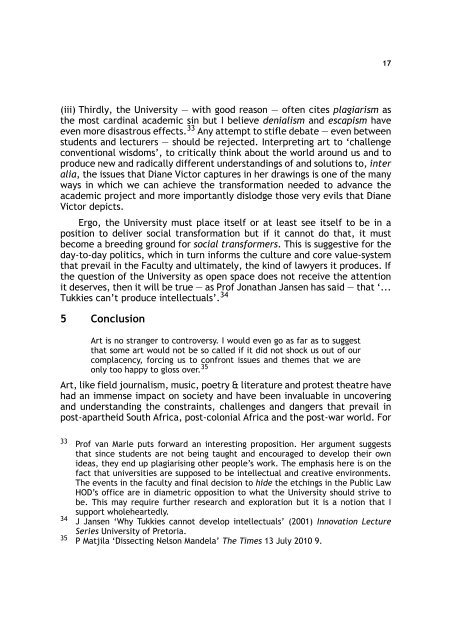Download this publication - PULP - University of Pretoria
Download this publication - PULP - University of Pretoria
Download this publication - PULP - University of Pretoria
Create successful ePaper yourself
Turn your PDF publications into a flip-book with our unique Google optimized e-Paper software.
(iii) Thirdly, the <strong>University</strong> — with good reason — <strong>of</strong>ten cites plagiarism as<br />
the most cardinal academic sin but I believe denialism and escapism have<br />
even more disastrous effects. 33 Any attempt to stifle debate — even between<br />
students and lecturers — should be rejected. Interpreting art to ‘challenge<br />
conventional wisdoms’, to critically think about the world around us and to<br />
produce new and radically different understandings <strong>of</strong> and solutions to, inter<br />
alia, the issues that Diane Victor captures in her drawings is one <strong>of</strong> the many<br />
ways in which we can achieve the transformation needed to advance the<br />
academic project and more importantly dislodge those very evils that Diane<br />
Victor depicts.<br />
Ergo, the <strong>University</strong> must place itself or at least see itself to be in a<br />
position to deliver social transformation but if it cannot do that, it must<br />
become a breeding ground for social transformers. This is suggestive for the<br />
day-to-day politics, which in turn informs the culture and core value-system<br />
that prevail in the Faculty and ultimately, the kind <strong>of</strong> lawyers it produces. If<br />
the question <strong>of</strong> the <strong>University</strong> as open space does not receive the attention<br />
it deserves, then it will be true — as Pr<strong>of</strong> Jonathan Jansen has said — that ‘...<br />
Tukkies can’t produce intellectuals’. 34<br />
5 Conclusion<br />
Art is no stranger to controversy. I would even go as far as to suggest<br />
that some art would not be so called if it did not shock us out <strong>of</strong> our<br />
complacency, forcing us to confront issues and themes that we are<br />
only too happy to gloss over. 35<br />
Art, like field journalism, music, poetry & literature and protest theatre have<br />
had an immense impact on society and have been invaluable in uncovering<br />
and understanding the constraints, challenges and dangers that prevail in<br />
post-apartheid South Africa, post-colonial Africa and the post-war world. For<br />
33 Pr<strong>of</strong> van Marle puts forward an interesting proposition. Her argument suggests<br />
that since students are not being taught and encouraged to develop their own<br />
ideas, they end up plagiarising other people’s work. The emphasis here is on the<br />
fact that universities are supposed to be intellectual and creative environments.<br />
The events in the faculty and final decision to hide the etchings in the Public Law<br />
HOD’s <strong>of</strong>fice are in diametric opposition to what the <strong>University</strong> should strive to<br />
be. This may require further research and exploration but it is a notion that I<br />
support wholeheartedly.<br />
34 J Jansen ‘Why Tukkies cannot develop intellectuals’ (2001) Innovation Lecture<br />
Series <strong>University</strong> <strong>of</strong> <strong>Pretoria</strong>.<br />
35 P Matjila ‘Dissecting Nelson Mandela’ The Times 13 July 2010 9.<br />
17

















